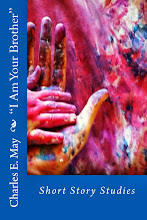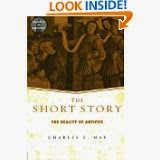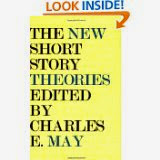Compiling a "Best
of" collection is a risky business. I have never been asked to do such a
thing, but can guess what pressures the compiler must consider. There is the
problem of "making a book," which usually necessitates some variety
as to subject matter and style—not all experimental, not all conventional
realism. Then there is the issue of a mixed representation of authors—not all
well-knowns, not all unknowns.
Foremost, of course, there
is the issue of subjectivity. Everyone has his or her own particular
preferences about favorite kinds of stories, favorite styles, approaches, etc.
I have read all five volumes of The Best
British Short Stories and have enjoyed the experience. I admire and respect
Nicholas Royle's editorial expertise and appreciate his efforts to stimulate
interest in the short story among British writers and readers.
However, as my last post
indicates, I do not always have the same opinion of some of the stories in the
2011 collection as he perhaps does. Of course, although I have read thousands
of stories in my career, I have not read the hundreds of stories he read from
which he chose the twenty in the collection. So I cannot question his judgment
that he has chosen the twenty best stories published in England in 2010.
The best I can do in this
final post on the 2011 edition of The
Best British Short Stories is to come clean about my own personal
preferences about some of the stories—those that I liked and those that I did
not particularly like—and try to explain why.
Lee Rourke's "Emergency
Exit" is a second-person point of view story that places the narrator in a
no-exit situation seeing himself as if he were outside himself, feeling
unsettled and not caring what he is doing. His detachment from reality is suggested
by his noting that the Emergency Exit sign is in Helvitica or maybe Microsoft
Sans Serif. He feels empty, as if he does not exist, as if nothing exists. A
man's eyes are like "two dark pools of nothingness." "Finally, you feel nothing." Everything
is without consequence or meaning. "I don't know where I'm going," he
says. The story reads a bit like a classroom exercise in which the professor
has asked students to write a story about meaninglessness. It raises the old
conundrum of whether one can write about meaninglessness with the story
becoming meaningless.
"Foreigner,"
which springs from the Falklands War, is a relatively transparent story about
the horrors of war and thus lends itself to generalized polemic. Inevitably, in
such a story, the central character recalls killing an enemy soldier and cannot
get it out of his mind. Also inevitably,
men talk about wars being about freedom, while mothers say their son did not
die for freedom . "There was nothing noble about the way he was sacrificed,"
a mother says, putting polemical statements in the mouths of characters. And as
the central character recalls killing an enemy soldier, he has a taste in his mouth
like a "rotting tooth." Such a story makes set pieces and clichés
seem inevitable as the woman says about her lost son, "Our marriage is
past. Even Alex is in the past now. And we've got to live in the present."
Getting tangled in such generalities then leads to more clichés, and bad
metaphors like "the word cracked like ice beneath too heavy a
weight." The story illustrates an
important truth—that just because the story deals with an important subject
does not make it an important story. War stories are often guilty of this, for
war is such a huge and important subject.
But it does not make for an important story unless the language controls
it, as it does, for example in American writer Tim O'Brien's "The Things
They Carried."
Sometimes stories just
want to play around with writing conventions. Philip Langeskov's "Notes on
a Love Story1" is a very brief story about a man who has just got his
first short story published in in Paris
Review; when he shares this news with his girlfriend they see a huge flock
of geese. It is the eleven academic style endnotes that make up the real story.
Some just supply information, e.g. who is George Plimpton and William Maxwell? But most of them provide personal information
about the narrator/author and his relationship with his girlfriend. It strikes me as a gimmick that does not seem
essential other than to suggest that the narrator is first and foremost a
writer.
The fact that I like SJ
Butler's "The Swimmer" probably gives me away as a reader who prefers
stories driven by an emotion, a mysterious obsession and written in a lyrical
fashion without lots of explanation or ideology or sociology. The story is
about a woman who decides to go swimming in the river that she can see from her
study. I like the prose that creates her situation:
"Down here at water level, she realises,
not only is she invisible to the rest of the world, but it is invisible to
her. The tops of the banks are at least
ten feet above her so all she can see is the river, the banks and the sky. Her
focus narrowed, she begins to notice tiny details; here where the river is
kinked around a root, there are weeds with narrow dark green leaves. In places
the banksides have been scraped back to bare earth by the spring floods , and
high up there are clusters of miniature animal holes"
During her swim, she sees
a swan: "She had never before realised the sheer size of a swan. Down
here, on its level, she is insignificant." The woman begins to spend more
and more time in the river, becoming more and more obsessed with the swan. Many days later, she swims nearer to the swan
and sees it is trapped in a nylon fishing line. She swims round and round the
swan unraveling the thread, until she frees the bird and it drifts away from
her in the current. She lets the current
take her too and catches a faint glimpse of the swan a white puff in the
distance. "And at the next bend she cannot tell it from the mist rising
from the water."
Call me a romantic and be
damned. But I like this lyrical obsessive connection between the woman and the water
and the swan. I don't know anything more
about the woman, nor do I need to to participate in her magical and mysterious
union with a rhythm and reality of the natural/ world.
I also like Heather
Leach's "So Much Time in a Life," mainly because its fairy-tale
language lures me in: "To begin with there were three children. The first, a girl with hair so dark and wet
that, as she came out of me, it looked like a seal pelt: the sleek fur of a
creature slipping from its underwater world onto the soft rock of my breast."
The story plays a bit with point of view: "When is the moment when she
becomes I? Is this it? They say that
most people hate it, the author stepping into her story, spoiling the fictional
dream. I hate it too, but here she is,
here I am, breaking, breaking, breaking the frame." The story is, like a
few others in the collection, about the writing process, but here, rather than
being just a gimmick, it seems right for a story that is about the relationship
between reality and the life of the imagination, a story about a woman creating
her children and losing them, about a woman's netherworld of what is real and
what is imagined.
Alan
Beard, "Staff Development." Just too much meaningless language and
meaningless sex.
Kirsty
Logan, "The Rental Heart" A clever trope derived from a futuristic
technology of being about to rent a heart, but the story exists only for the
extended metaphor.
I liked Bernie
McGill's "No Angel, "from the first sentence: "The first time I
saw my father after he died, I was in the shower, hair plastered with conditioner
, when the water stuttered and turned cold." I liked the rest of the story
because of the restrained way it deals with death in Northern Ireland. But, sometimes I like a story because it
strikes a personal note. I liked this
story because my mother-in-law, a wonderful woman who came to America from
Belfast after WWII to marry an American soldier she met at a dance, had just
died at age 90 when I read it. She was a wonderful woman who my wife and I
cared for the last few years. Purely
personal reason, but unavoidable.
John Burnside,
"Slut's Hair" is another favorite for me because of my empathy with a
woman who is married to a brutish husband who insists on pulling out one of her
bad teeth with a pair of pliers. The woman feels helpless against the man, so
she creates something to save from him, since she cannot save herself—an
imaginary mouse she constructs out of a fistful of dust that her mother called
"slut's hair."
Sometimes I read a story
that I like, but am unable to say why, for example, Alison Moore's "When
the Door Closed, It Was Dark" about a young British au pair girl who is
hired by a family in a foreign country. There is a baby in the family she is to
help care for, but the mother is mysteriously not there. The atmosphere is
oppressive, even threatening, and the story is loaded with premonitions about
something happening to the baby, but even though I feel the story is too
self-consciously wired, there is something about the vulnerability of the young
woman that arouses my sympathy, and then the expected unexpectedly happens at
the end. Hard to resist.
I don't care for stories
that feel they have to explain everything. Sally Vickers's
"Epiphany," for example, "He had mourned his absent father,
fiercely, inconsolably, endlessly, desperately." "The note of whimsy
was terrible." "Charlie…felt a further rush of absolving
relief." "He felt nothing. Not
even contempt." "He could never have envisaged this hesitant man with
the unsettle squeak and tremor in his voice. Sharply, fervently, he wished this
newly recovered parent to the bottom of the sea." Just too much explanation
of feelings.
I am going to try to talk
about other volumes in the Best British
Short Stories series in future blogs, but I will probably only focus on those that
are my favorites. My mother always said, "If you can't say something nice about some thing, don't say anything at all." That isn't easy, Mom, but I will try.




